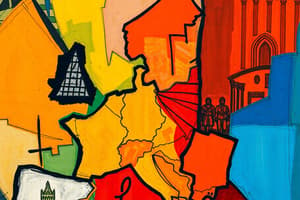Podcast
Questions and Answers
Who were the two most notable scientists during the Scientific Revolution?
Who were the two most notable scientists during the Scientific Revolution?
- Antonie van Leeuwenhoek and Robert Hooke
- Johannes Kepler and Francis Bacon
- Isaac Newton and Galileo Galilei (correct)
- Robert Boyle and Blaise Pascal
What were the causes and effects of the Industrial Revolution?
What were the causes and effects of the Industrial Revolution?
- Causes: agricultural innovations and population growth. Effects: urbanization and new methods of production. (correct)
- Causes: artistic movements and cultural exchange. Effects: scientific advancements and new forms of government.
- Causes: military conflicts and territorial expansion. Effects: social inequality and economic instability.
- Causes: political upheaval and religious reform. Effects: increased trade and exploration.
What were the major causes of World War I?
What were the major causes of World War I?
- Nationalism, cultural differences, the rise of fascism, and the Treaty of Versailles.
- Economic competition, territorial disputes, religious conflict, and the spread of communism.
- Political corruption, social inequality, environmental degradation, and the Great Depression.
- Militarism, alliances, imperialism, and the assassination of Archduke Franz Ferdinand. (correct)
Flashcards are hidden until you start studying
Study Notes
Notable Scientists of the Scientific Revolution
- Two of the most notable scientists of the Scientific Revolution were Galileo Galilei and Isaac Newton
- Galileo Galilei (1564-1642) was an Italian astronomer, physicist, and mathematician who played a major role in the Scientific Revolution
- Isaac Newton (1642-1727) was an English physicist, mathematician, and astronomer who is widely recognized as one of the most influential scientists in history
The Industrial Revolution
- The Industrial Revolution was a period of significant economic, technological, and social change that occurred in the late 18th and early 19th centuries in Europe and North America
- Causes of the Industrial Revolution:
- New sources of energy, such as coal and steam power
- Development of new machines and manufacturing technologies
- Increased investment in transportation and communication systems
- Growing demand for goods and services
- Effects of the Industrial Revolution:
- Transition from manual labor to machine-based manufacturing
- Development of new social classes and urbanization
- Increased productivity and economic growth
- Environmental and social consequences, such as pollution and exploitation of workers
Causes of World War I
- Major causes of World War I:
- Imperialism and colonial rivalries
- Nationalism and militarism
- Alliances and entangling relationships between European nations
- Assassination of Archduke Franz Ferdinand of Austria-Hungary in 1914
- Complex system of alliances and treaties that led to the escalation of violence
Studying That Suits You
Use AI to generate personalized quizzes and flashcards to suit your learning preferences.




